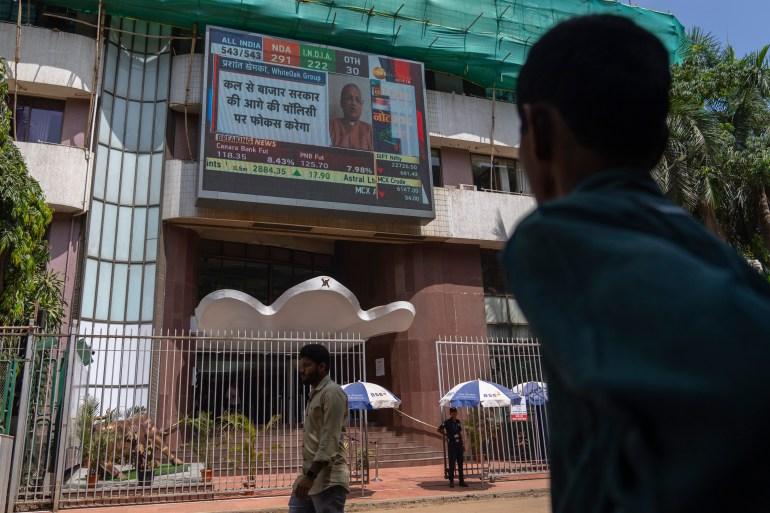Source: ALJAZEERA
ALJAZEERA MEDIA NETWORK

The Indian stock market suffered significant losses following the Bharatiya Janata Party's failure to secure a parliamentary majority, causing economic uncertainty.
India’s stock market experienced its sharpest decline in four years following a surprising election result where Prime Minister Narendra Modi’s Bharatiya Janata Party (BJP) lost its parliamentary majority.
Tuesday’s election results mean Modi will now depend on smaller parties to achieve a governing majority in India’s 543-member Lok Sabha, creating uncertainty about his ability to advance his pro-business policies.
The NSE Nifty 50 and BSE Sensex indexes ended 5.93 percent and 5.74 percent lower, respectively, on Tuesday, after falling as much as 8.5 percent earlier in the session.
Indian stocks saw additional losses on Wednesday morning before recovering in the afternoon, with both indexes up more than 1.5 percent by 05:30 GMT.
Modi’s economic policies have been well-received by investors throughout his ten-year leadership.
He has vowed to turn India into a developed nation by 2047, investing heavily in infrastructure, supporting domestic manufacturing, attracting foreign investment, reducing bureaucratic hurdles, and fighting corruption.
Under Modi, the Nifty 50 index nearly tripled in value, although some analysts believe many Indian companies are now overvalued.
Earlier this year, India’s stock market valuation reached $4.3 trillion, surpassing Hong Kong to become the world’s fourth-largest market.
Before Tuesday’s unexpected election outcome, Indian stocks hit record highs as exit polls suggested a landslide victory for the BJP-led National Democratic Alliance (NDA).
Modi, a popular yet divisive figure, has overseen a period of robust economic growth in the world’s most populous country.
India’s gross domestic product (GDP) grew by 8.2 percent in the fiscal year ending in April, outpacing most developing and developed nations.
Over the last decade, GDP per capita rose from around $5,000 to over $7,500.
During this period, India progressed from being the ninth-largest economy to the fifth-largest globally.
Despite a third term as prime minister looking almost certain for Modi, his need to negotiate with smaller coalition partners suggests potential compromises in his economic policies.
“A more significant majority for the BJP-led NDA might have led to more aggressive reforms and less need for populist measures, continuing capital expenditure plans,” Garima Kapoor, an economist and senior vice president at Elara Capital in New Delhi, told Al Jazeera.
“The markets are adjusting to this change, and thus, most public sector units, public sector banks, and capital expenditure-linked stocks are experiencing significant corrections.”
Alexandra Hermann, a senior economist at Oxford Economics, said Modi’s smaller-than-expected majority would complicate reforms related to land, labor, and capital regulations.
“Nevertheless, infrastructure investment will likely remain a priority,” Hermann told Al Jazeera.
Uncertainty, perhaps more than anything else, troubles markets, a dynamic resulting from Tuesday’s inconclusive outcome.
Many of India’s economic strengths remain unaffected by the election results or the ruling party’s identity.
No matter what direction Modi’s coalition takes, the country will continue to benefit from a large, relatively young population.
New Delhi’s traditional policy of non-alignment is also likely to position it advantageously in the ongoing geopolitical rivalry between the United States and its allies on one side, and Russia and China on the other.
“We believe the election outcome does not change the long-term outlook for the Indian market, which is supported by favorable population demographics and extended geopolitical tensions between China and the US favoring a shift to India,” Gary Tan, a portfolio manager at Allspring Global Investments, told Al Jazeera.
Kapoor of Elara Capital stated that she does not foresee a significant shift in policy following the election results.
“In the long term, an NDA majority of 290 or 310 seats does not make much difference in terms of policy approach. The primary shift lies in whether we witness aggressive supply-side reforms or a balance between supply-side and demand-side reforms,” she said.
Despite India’s strong GDP growth, the economy faces significant challenges, including widespread poverty, rising inequality, and entrenched corruption.
One of the most pressing issues is a lack of quality jobs to meet the needs of its vast population.
An International Labour Organization report earlier this year highlighted a “mismatch” between the aspirations of India’s educated youth and available job opportunities.
“Beyond merely considering the unemployed, many young people, especially women, are neither in education, employment, nor training,” the UN body reported.
Tan mentioned that India’s growing household debt is another concern.
“The Reserve Bank of India has been intervening to manage this risk. While positive for more sustainable growth, the near-term impact could result in slower credit growth at a critical time when private corporate capital expenditure is trying to catch up from years of underinvestment alongside the rollout of large-scale infrastructure projects,” he said.
Following years of substantial gains, some analysts believe many Indian companies are now overvalued, partly due to a massive influx of inexperienced small-time investors.
Financial services firm Morning Star quoted a portfolio manager last month noting that Indian stocks were trading at higher prices than other emerging markets.
“We remain selective in the firms we invest in and prefer those with sustainable earnings power whose share prices are discounted relative to our valuation of their intrinsic worth,” Morning Star quoted Chetan Sehgal of Franklin Templeton as saying.
Your email address will not be published. Required fields are marked *